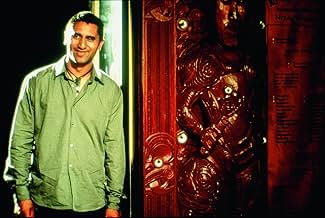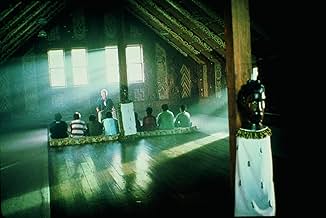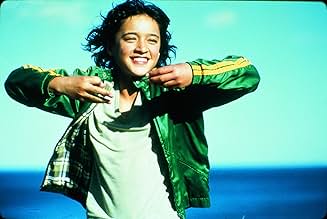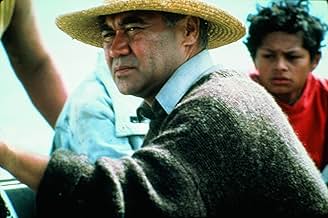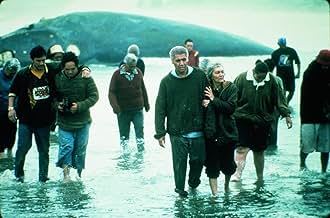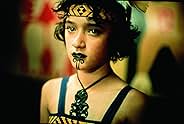A contemporary story of love, rejection and triumph as a young Maori girl fights to fulfill a destiny her grandfather refuses to recognize.A contemporary story of love, rejection and triumph as a young Maori girl fights to fulfill a destiny her grandfather refuses to recognize.A contemporary story of love, rejection and triumph as a young Maori girl fights to fulfill a destiny her grandfather refuses to recognize.
- Nominated for 1 Oscar
- 33 wins & 35 nominations total
- Maka
- (as Mabel Wharekawa-Burt)
- Hemi's Dad
- (as Roimata Taimana)
- Jake
- (as Tyrone White)
- Director
- Writers
- All cast & crew
- Production, box office & more at IMDbPro
Storyline
Did you know
- TriviaThe whales in the movie are a combination of footage of real whales, life size models (some with humans creating movement) and CGI. Keisha Castle-Hughes said the key whale riding scene took place 15-20 miles offshore, and was terrifying.
- GoofsThe father and grandfather argue after the slide show, and the father goes to pull down the white sheet that was hung over some drapes to act as a screen. He pulls it down, along with the rod and orange drapes that the sheet was hanging from. Moments later, the drapes are back up in place and hanging perfectly straight, without enough time for him to re-hang the drapes.
- Quotes
[first lines]
Paikea: In the old days, the land felt a great emptiness. It was waiting. Waiting to be filled up. Waiting for someone to love it. Waiting for a leader.
[child birth scene]
Paikea: And he came on the back of a whale. A man to lead a new people. Our ancestor, Paikea. But now we were waiting for the firstborn of the new generation, for the descendant of the whale rider. For the boy who would be chief.
Paikea: There was no gladness when I was born. My twin brother died, and took our mother with him.
- Crazy creditsDedicated to those who have gone before
- ConnectionsFeatured in The Making of 'Whale Rider' (2003)
Screenplay author and director Niki Caro faithfully translated Witi Ihimaera's novel of the same name, a poignant and sometimes sad but ultimately uplifting story of New Zealand Maoris seeking, with the leadership of a difficult, stubborn and often harsh elder to sustain their peoples' values and customs.
Australia and New Zealand are both encountering, in politics and in culture (and often the two are inextricably linked), their shared heritage of white oppression of native peoples. Much of this history is unknown to Americans and Europeans who view Australia through a bird's eye picture of the Sydney Opera House and New Zealand with even fewer associational icons.
Recently, "Rabbitproof Fence" painfully depicted the policy of Australia to force lighter skin aborigines into "schools" where they would be nurtured to become "semi-whites" and then married to those of similar skin tone. The object was to bleach the blackness out of Australia and the horrors of this incarnation of cultural and anthropological genocide are on full display in that film.
"Whale Rider" takes a different and, in the end, perhaps a more powerful approach. There are virtually no whites in the film and only children's t-shirts and some music blasting from a boombox suggests the encroaching force of the controlling majority.
The cast is unknown to Americans and their names can be found on the IMDb homepage for the film. The lead actress, however, must be named. In the role of "Pai," a young girl whose mother dies at her birth along with her twin brother, is the extraordinary Keisha Castle-Hughes. She imbues every scene with a commanding and inviting vitality. Hers is an Academy Award (and any other major award) performance.
Pai's father left New Zealand for Europe, there to create and sell Maori crafts. She lives with her grandmother and grandfather, the latter some sort of unelected chieftain of the oceanside community. Bitter that no male heir will succeed him and alternately cruel and loving to his reluctantly acknowledged granddaughter, Koro starts a school to supplement the young boys' secular education with inculcation of the ways of the Maori. Pai wishes to join as an equal and is firmly, indeed harshly rebuffed at every turn.
If the Maori language has the phrase "You go, girl!," then it be directed towards the indefatigable but not arrogant Pai. It would have been easy to make her the kind of thoughtless rebel that nature often programs teenagers to be. The depth of her character resides in her simultaneous quest for equality and her understanding of her grandfather's unyielding attachment to patriarchal values. Pai's close relationship with her grandmother, a woman living a life universally recognizable to Americans, provides warmth and support and do some of her other relationships.
The story unfolds seamlessly with Maori music and rituals bridging the spoken dialogue (mostly in English, some in Maori with subtitles).
Partly a straight tale, partly a gripping mystical fable, "Whale Rider" never becomes saccharine.
The music and Maori songs complement but do not compete with the dialogue, a welcome change from many movies today. The land and the ocean are rawly gorgeous.
As in Australia, relations today between New Zealand's indigenous people and the descendants of their vanquishers are sometimes tense. There are open wounds from continuing political collisions over land and culture. The Maoris are not a monolith and internal dissension is active. Serious attempts to sustain Maori values and culture in the face of assimilative pressures meet with varied degrees of success (in Koro's Maori school the kids wear t-shirts with rock themes and one has a shirt advertising an upstate New York resort area if I saw correctly). New Zealand's most internationally renowned Maori is the opera diva Kiri te Kanawa who is now dedicated to Maori cultural restoration projects. "Whale Rider" can only give a boost to such efforts which, as this film shows, makes not only New Zealand but the world richer.
This is a film I will acquire on DVD as soon as it is available.
10/10.
- How long is Whale Rider?Powered by Alexa
Details
- Release date
- Countries of origin
- Official sites
- Languages
- Also known as
- Người Cưỡi Cá Voi
- Filming locations
- Production companies
- See more company credits at IMDbPro
Box office
- Budget
- $3,500,000 (estimated)
- Gross US & Canada
- $20,779,666
- Opening weekend US & Canada
- $137,418
- Jun 8, 2003
- Gross worldwide
- $41,062,976
- Runtime1 hour 41 minutes
- Color
- Sound mix
- Aspect ratio
- 2.35 : 1
Contribute to this page









